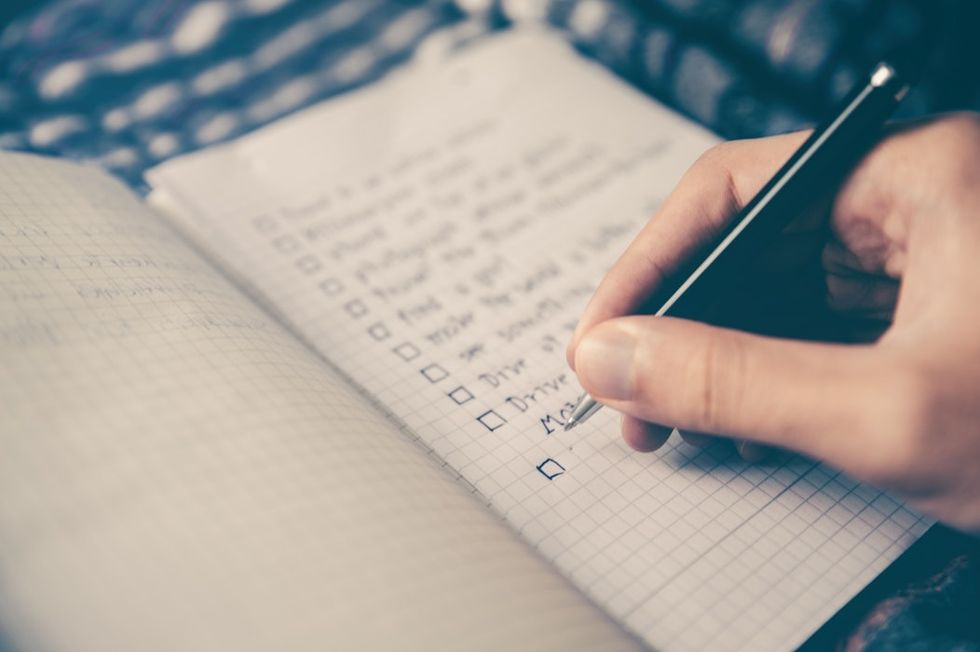Whenever we have the opportunity to meet people who have been successful, one of the first things students ask is how they manage their time. We expect an answer that will solve our time-management problems, but the answer is usually not a magic bullet solution. It's also usually unsatisfactory.
But through speaking to many people and hearing others ask this question, and with a little experience of my own, I collected five helpful tips that will get you started on the road to success. If you implement them, hopefully, next semester will be a little less stressful.
1. Write a to-do list.

https://unsplash.com/photos/RLw-UC03Gwc
This may sound redundant, but it's the first step to get you on track with managing your time. You should separate out the immediate goals, to be taken care of within a day or two, and the longer term goals, like within the week or month. Take your smartphone or a pen and paper and write down your day's tasks. It is preferable to write them at least a day in advance to reduce the pressure and have everything ready for the next day.
2. Take breaks.

https://unsplash.com/photos/8i2fHtStfxk
Don't dwell on one task for a long time. Studies have shown that the brain needs to take a break in order to better focus on a task. A study showed that those who took two brief breaks within a 50-minute task stayed consistently focused on their task while those who didn't, had a "significant" decline over time. This demonstrates our brain's need for a break to function optimally. I found it useful if you're getting stuck on something to take a brief walk or drink some water or your favorite beverage, to refresh your mind. Think of it like a computer that's overloaded with stuff and needs to clean its cache, you're basically doing the same thing for your brain. After doing this I often find that I'm able to get my thoughts back together.
3. Time your tasks.

https://unsplash.com/photos/5Z398JOmCKw
Plan your day down to the minute, but don't forget to put in some leisure time too. I found his very helpful in knowing what I'm able to do in a day and staying focused on my tasks. The most important thing is to be honest about how long your tasks take. You'll probably underestimate how long things take at first, but don't worry this should improve with repetition. I was always able to accomplish more things when I did this and felt like my day was more productive. It's always satisfying when you can check things off of your list.
4. Switch things around.

https://unsplash.com/photos/-8a5eJ1-mmQ
This follows the idea of taking breaks. Sometimes a break can be from performing a longer more tedious task, to performing a simpler one. If for example you're studying for a test, or writing a term paper but also have to pay your credit card bill, you could use that as your break. Also when you have tasks that are enjoyable or less stressful and ones that are not, alternate between them. Don't try to do all the difficult tasks back-to-back or you'll be stressed out more quickly. Think of it as a reward system, if you completed a difficult task reward yourself with some leisure time or your more enjoyable task. This helps as an encouragement to make your difficult tasks a little less stressful.
5. Work on long-term projects a little every day.

https://unsplash.com/photos/AJCNM8JrzT8
If you have something you know you'll need to complete within a week or month, don't wait till the last minute. Chip away at it every day. Even if you work for only 20 minutes it will make a big difference. When you're timing out your day, plan some time for these goals and try to commit to them.
From my experience, these tips made things much easier to manage. I hope you find these tips as useful as I did. At least they can serve as a starting point for better managing your time. Don't forget to start the new year with a commitment to manage your time more wisely.



 Photo by
Photo by  Photo by
Photo by  Photo by
Photo by 



















